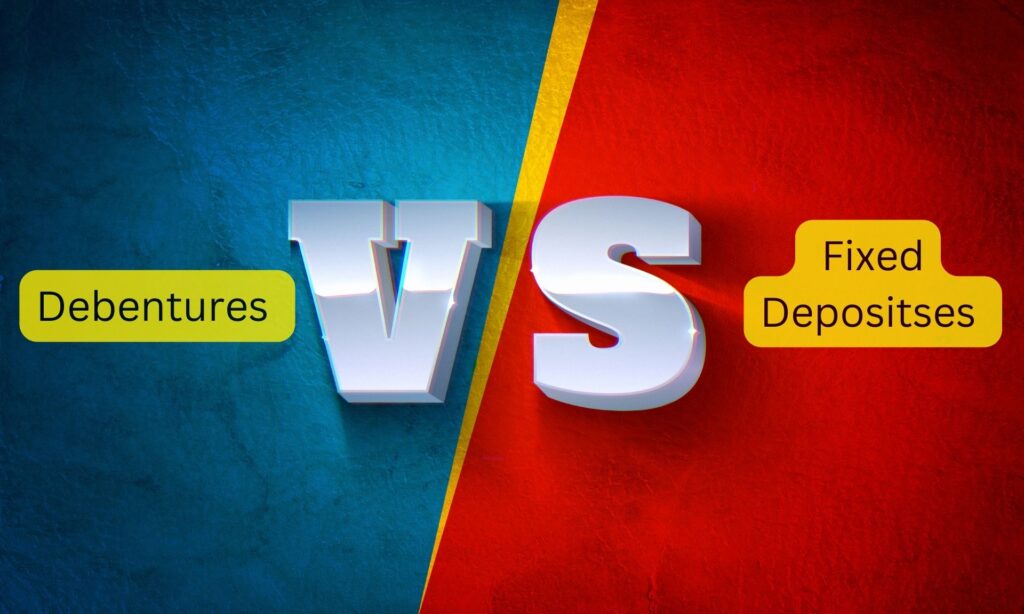When it comes to investment options, debentures vs fixed deposits are two popular choices for individuals looking to grow their savings. While both offer attractive returns, they differ significantly in terms of structure, risk, and returns. This article will explore the differences between debentures and fixed deposits to help investors make informed decisions based on their financial goals and risk tolerance.
Understanding Debentures

Debentures are debt instruments issued by corporations or governments. They represent a loan agreement between the issuer and the investor, where the issuer borrows money from the investor and promises to repay the principal amount along with interest over a specified period. Debentures can be secured or unsecured. Secured debentures are backed by specific assets of the issuer, providing an additional layer of security for investors. Unsecured debentures, on the other hand, rely solely on the issuer’s creditworthiness.
One of the key features of debentures is that they can have fixed or floating interest rates. The interest rate may be linked to a benchmark rate, such as the government bond yield or a reference rate. Debentures generally have long-term maturity periods, ranging from a few years to several decades.
Debentures are issued by corporations or governments to raise funds for various purposes, such as expansion, projects, or debt refinancing. They are tradable on stock exchanges, allowing investors to buy or sell them before maturity. This provides liquidity and the opportunity to exit the investment early.
Understanding Fixed Deposits
Fixed deposits, also known as term deposits or time deposits, are bank deposits where an individual lends money to a bank for a fixed period at a predetermined interest rate. The interest rate offered by fixed deposits is usually set by prevailing low-risk market standards like the London Inter-bank Offered Rate (LIBOR) or Treasury rate.
Fixed deposits offer a fixed interest rate for the entire deposit tenure. The rate is determined by the bank at the time of deposit and remains unchanged throughout the tenure. They have shorter maturity periods, typically ranging from a few months to a few years, depending on the investor’s preference.
Fixed deposits are considered low-risk investments as they are secured by the bank, meaning that in case of default or bankruptcy, the deposit amount (up to a certain limit) is protected by deposit insurance schemes. However, fixed deposits are not tradable, and once deposited, the funds are locked in for the agreed-upon tenure, and early withdrawal may attract penalties or reduced interest rates.
READ ALSO: Debentures vs. Bonds: Understanding the Key Differences
Comparing Debentures and Fixed Deposits
Risk and Return
Debentures carry higher risk compared to fixed deposits. The risk is associated with the creditworthiness of the issuer and market conditions. Debentures can offer higher returns to compensate for the higher risk. On the other hand, fixed deposits provide stable returns but at a lower rate compared to debentures.
Credit Rating
Debentures are assigned credit ratings by rating agencies, indicating the issuer’s creditworthiness. Higher-rated debentures are considered safer investments. Fixed deposits are not assigned credit ratings, as they are issued by banks. However, the creditworthiness of the bank can be assessed based on its financial stability and reputation.
Tax Implications
Interest income from debentures is taxable as per the individual’s income tax slab. Interest income from fixed deposits is also taxable as per the individual’s income tax slab. However, Tax Deducted at Source (TDS) is applicable if the interest exceeds a certain threshold set by the tax authorities.
Investment Size
Debentures typically require larger investments, making them more suitable for institutional investors or individuals with higher disposable income. Fixed deposits offer flexibility in investment size, allowing individuals to invest smaller amounts, making them accessible to a wide range of investors.
Conclusion
Both debentures and fixed deposits offer investment opportunities for individuals seeking to grow their savings. However, they differ significantly in terms of risk, returns, structure, and liquidity. Debentures are generally riskier but offer the potential for higher returns, while fixed deposits are considered low-risk investments with stable but lower returns.
The choice between debentures and fixed deposits ultimately depends on an individual’s financial goals, risk tolerance, and investment preferences. Investors with a higher appetite for risk and longer investment horizons may find debentures more appealing, while those seeking stability and low risk may prefer fixed deposits.
It is crucial for investors to carefully evaluate their financial objectives, risk tolerance, and investment horizons before making an investment decision. Consulting with a financial advisor can provide valuable insights and guidance to ensure a well-balanced, diversified investment portfolio that aligns with their goals and risk profile.
Regardless of the investment choice, it is essential to conduct thorough research, understand the terms and conditions, and stay informed about market developments to make informed decisions and maximize returns while managing risks effectively.
READ ALSO: What is an Investment Grade Bond Index? A Guide for New Investors
FAQs
1. Can debentures be converted into shares?
Some debentures can be convertible, meaning that the investor has the option to convert the debentures into shares of the issuing company at a predetermined price and conversion ratio. However, most debentures issued in India are non-convertible, which means they cannot be converted into shares.
2. What happens if the issuer of a debenture defaults?
If the issuer of a debenture defaults, the consequences can be severe for investors. In the case of secured debentures, the investors have a claim on the specific assets pledged as collateral. For unsecured debentures, investors may have to wait in line with other creditors to recover their investments, depending on the bankruptcy proceedings.
3. Can fixed deposits be withdrawn before maturity?
In most cases, fixed deposits cannot be withdrawn before maturity. If early withdrawal is permitted, it typically attracts penalties or reduced interest rates. However, banks may allow premature withdrawal in exceptional circumstances, such as medical emergencies or other hardships, subject to their policies and terms.
4. Are fixed deposits covered by deposit insurance?
Yes, fixed deposits in India are typically covered by deposit insurance schemes up to a certain limit. For example, the Deposit Insurance and Credit Guarantee Corporation (DICGC) insures fixed deposits in banks up to $6000 per depositor per bank.
5. Can non-resident Indians (NRIs) invest in debentures and fixed deposits in India?
Yes, NRIs can invest in debentures and fixed deposits in India. However, they may be subject to specific regulations and guidelines set by the Reserve Bank of India (RBI) and the Securities and Exchange Board of India (SEBI) for such investments.
In another related article, Private Registered Bonds: An Exclusive Investment Opportunity for Accredited Investors





